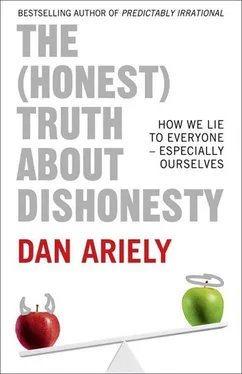Ariely, Dan - The (Honest) Truth About Dishonesty - How We Lie to Everyone – Especially Ourselves
Здесь есть возможность читать онлайн «Ariely, Dan - The (Honest) Truth About Dishonesty - How We Lie to Everyone – Especially Ourselves» весь текст электронной книги совершенно бесплатно (целиком полную версию без сокращений). В некоторых случаях можно слушать аудио, скачать через торрент в формате fb2 и присутствует краткое содержание. Жанр: Старинная литература, на английском языке. Описание произведения, (предисловие) а так же отзывы посетителей доступны на портале библиотеки ЛибКат.
- Название:The (Honest) Truth About Dishonesty: How We Lie to Everyone – Especially Ourselves
- Автор:
- Жанр:
- Год:неизвестен
- ISBN:нет данных
- Рейтинг книги:4 / 5. Голосов: 1
-
Избранное:Добавить в избранное
- Отзывы:
-
Ваша оценка:
- 80
- 1
- 2
- 3
- 4
- 5
The (Honest) Truth About Dishonesty: How We Lie to Everyone – Especially Ourselves: краткое содержание, описание и аннотация
Предлагаем к чтению аннотацию, описание, краткое содержание или предисловие (зависит от того, что написал сам автор книги «The (Honest) Truth About Dishonesty: How We Lie to Everyone – Especially Ourselves»). Если вы не нашли необходимую информацию о книге — напишите в комментариях, мы постараемся отыскать её.
The (Honest) Truth About Dishonesty: How We Lie to Everyone – Especially Ourselves — читать онлайн бесплатно полную книгу (весь текст) целиком
Ниже представлен текст книги, разбитый по страницам. Система сохранения места последней прочитанной страницы, позволяет с удобством читать онлайн бесплатно книгу «The (Honest) Truth About Dishonesty: How We Lie to Everyone – Especially Ourselves», без необходимости каждый раз заново искать на чём Вы остановились. Поставьте закладку, и сможете в любой момент перейти на страницу, на которой закончили чтение.
Интервал:
Закладка:
HEROIC VETERANS?
In 1959, America’s “last surviving Civil War veteran,” Walter Williams, died. He was given a princely funeral, including a parade that tens of thousands gathered to see, and an official week of mourning. Many years later, however, a journalist named William Marvel discovered that Williams had been only five years old when the war began, which meant he wouldn’t have been old enough at any point to serve in the military in any capacity. It gets worse, though. The title that Walter Williams bore falsely to the grave had been passed to him from a man named John Salling, who, as Marvel discovered, had also falsely called himself the oldest Civil War veteran. In fact, Marvel claims that the last dozen of so-called oldest Civil War veterans were all phony.
There are countless other stories like these, even in recent wars, where one might think it would be more difficult to make up and sustain such claims. In one example, Sergeant Thomas Larez received multiple gunshot wounds fighting the Taliban in Afghanistan while helping an injured soldier to safety. Not only did he save his friend’s life, but he rallied from his own wounds and killed seven Taliban fighters. So went the reporting of Larez’s exploits aired by a Dallas news channel, which later had to run a retraction when it turned out that although Larez was indeed a marine, he had never been anywhere near Afghanistan—the entire story was a lie.
Journalists often uncover such false claims. But once in a while, it’s the journalist who’s the fibber. With teary eyes and a shaky voice, the longtime journalist Dan Rather described his own career in the marines, even though he had never made it out of basic training. Apparently, he must have believed that his involvement was far more significant than it actually was. 1
THERE ARE PROBABLYmany reasons why people exaggerate their service records. But the frequency of stories about people lying on their résumés, diplomas, and personal histories brings up a few interesting questions: Could it be that when we lie publicly, the recorded lie acts as an achievement marker that “reminds” us of our false achievement and helps cement the fiction into the fabric of our lives? So if a trophy, ribbon, or certificate recognizes something that we never achieved, would the achievement marker help us hold on to false beliefs about our own ability? Would such certificates increase our capacity for self-deception?
BEFORE I TELLyou about our experiments on this question I should point out that I proudly hang two diplomas on my office wall. One is an “MIT Bachelor of Science in Charm,” and the other is a “PhD in Charm,” also from MIT. I was awarded these diplomas by the Charm School, which is an activity that takes place at MIT during the cold and miserable month of January. To fulfill the requirements, I had to take many classes in ballroom dancing, poetry, tie tying, and other such cotillion-inspired skills. And in truth, the longer I have the certificates on my office wall, the more I believe that I am indeed quite charming.
WE TESTED THEeffects of certificates by giving our participants a chance to cheat on our first math test (by giving them access to the answer key). After they exaggerated their performance, we gave some of them a certificate emphasizing their (false) achievement on that test. We even wrote their name and score on the certificate and printed it on nice, official-looking paper. The other participants did not receive a certificate. Would the achievement markers raise the participants’ confidence in their overstated performance, which in reality was partially based on consulting the answer key? Would it make them believe that their score was, indeed, a true reflection of their ability?
As it turns out, I am not alone in being influenced by diplomas hanging on the wall. The participants who received a certificate predicted that they would correctly answer more questions on the second test. It looks as though having a reminder of a “job well done” makes it easier for us to think that our achievements are all our own, regardless of how well the job was actually done.
THE NINETEENTH-CENTURY NOVELISTJane Austen provided a fantastic example of the way our own selfish interests, together with the help of others around us, can get us to believe that our selfishness is really a mark of charity and generosity. In Sense and Sensibility there is a revealing scene in which John, the first and only son and legal heir, considers what, exactly, is involved in a promise he made to his father. At his father’s deathbed, John promises the old man to take care of his very kind but poor stepmother and three half sisters. Of his own accord, he decides to give the women £3,000, a mere fraction of his inheritance, which would take care of them nicely. After all, he genially reasons, “he could spare so considerable a sum with little inconvenience.”
Despite the satisfaction John gets from this idea and the ease with which the gift can be given, his clever and selfish wife convinces him—without much difficulty and with a great deal of specious reasoning—that any money he gives his step-family will leave him, his wife, and their son “impoverished to a most dreadful degree.” Like a wicked witch from a fairy tale, she argues that his father must have been light-headed. After all, the old man was minutes from death when he made the request. She then harps on the stepmother’s selfishness. How can John’s stepmother and half sisters think they deserve any money? How can he, her husband, squander his father’s fortune by providing for his greedy stepmom and sisters? The son, brainwashed, concludes that “It would be absolutely unnecessary, if not highly indecorous, to do more for the widow and his father’s three daughters …” Et voilà! Conscience appeased, avarice rationalized, fortune untouched.
SELF-DECEPTION IN SPORTS
All players know that steroid use is against the rules and that if they are ever discovered using them it will tarnish their records as well as the sport. Yet the desire to beat new (steroid-fueled) records and to win media attention and fan adoration drives many athletes to cheat by doping. The problem is everywhere and in every sport. There was Floyd Landis, who was stripped of his Tour de France victory because of steroid use in 2006. The University of Waterloo in Canada suspended its entire football team for a year when eight players tested positive for anabolic steroids. A Bulgarian soccer coach was banned from the sport for four years for giving players steroids before a match in 2010. And yet we can only wonder what steroid users think as they win a match or while receiving a medal. Do they recognize that their praise is undeserved, or do they truly believe that their performance is a pure tribute to their own skill?
Then, of course, there’s baseball. Would Mark McGwire hold so many records if not for steroid use? Did he believe his achievement was owing to his own skill? After admitting to steroid use, McGwire stated, “I’m sure people will wonder if I could have hit all those home runs had I never taken steroids. I had good years when I didn’t take any, and I had bad years when I didn’t take any. I had good years when I took steroids, and I had bad years when I took steroids. But no matter what, I shouldn’t have done it and for that I’m truly sorry.” 2
Sorry he may be, but in the end neither his fans nor McGwire himself can know exactly how good he really is.
AS YOU CANsee, people tend to believe their own exaggerated stories. Is it possible to stop or at least decrease this behavior? Since offering money to people to judge their performance more accurately did not seem to eliminate self-deception, we decided to intervene beforehand, right at the moment people were tempted with the opportunity to cheat. (This approach is related to our use of the Ten Commandments in chapter 2, “Fun with the Fudge Factor.”) Since our participants were clearly able to ignore the effect that the answer key had on their scores, we wondered what would happen if we made the fact that they were relying on the answer key more obvious at the moment that they were using it. If using the answer key to boost their scores was blatantly obvious, would they be less able to convince themselves that they had known the correct answer all along?
Читать дальшеИнтервал:
Закладка:
Похожие книги на «The (Honest) Truth About Dishonesty: How We Lie to Everyone – Especially Ourselves»
Представляем Вашему вниманию похожие книги на «The (Honest) Truth About Dishonesty: How We Lie to Everyone – Especially Ourselves» списком для выбора. Мы отобрали схожую по названию и смыслу литературу в надежде предоставить читателям больше вариантов отыскать новые, интересные, ещё непрочитанные произведения.
Обсуждение, отзывы о книге «The (Honest) Truth About Dishonesty: How We Lie to Everyone – Especially Ourselves» и просто собственные мнения читателей. Оставьте ваши комментарии, напишите, что Вы думаете о произведении, его смысле или главных героях. Укажите что конкретно понравилось, а что нет, и почему Вы так считаете.












